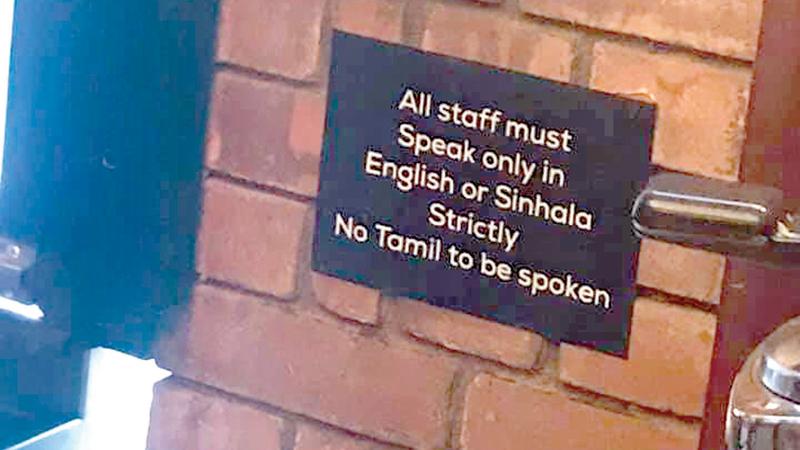
More than sixty years ago, the South African government introduced an Act which deepened the segregation of its society as black and white. Act no 49 of 1953 or the ‘Reservation of Separate Amenities Act’, was one of the most sickening policies introduced by any government in history. But today, it is just an unpleasant memory to both South Africa and the world.
However, bringing the same kind of apartheid policies to Sri Lanka, a plush looking restaurant in Colombo 7, had banned its staff from speaking in Tamil, one of the two official languages of the country.
A poster by the Peppermint Café in Horton Place, saying “All staff must speak only in English or Sinhala. Strictly no Tamil to be spoken,” came to light thanks to social media, mainly Twitter. Many were disgusted by the behaviour of the restaurant’s management.
Minister of National Integration, Official Languages, Social Progress and Hindu Religious Affairs Mano Ganesan was also among them.
“Peppermint Café, a privately owned restaurant at No 76, Wijerama Mawatha, I’m told, displays this notice violating Chapter III-Fundamental Rights clause 12 - Right to Equality of the Constitution. I have instructed the Official Languages Commission to step in. Violators may have to face legal consequences,” he had tweeted. When contacted, the Official Languages Commission had received many complaints from various parties, including the Minister himself. Considering the huge public attention it has garnered, the Commission has written to the restaurant calling for explanation.
“If people take this as an example, other hotels and restaurants will try to put similar advertisements leading to various other problems. So, we must be strict. We want the restaurant management to send us an immediate reply,” the Chairman of the Official Languages Commission, Professor S. Sandarasegaram told the Sunday Observer.
However, following social media attacks and the Official Languages Commission intervening, the restaurant management has removed their poster, with an excuse published through social media.
“Dear beautiful people, we apologise for any misunderstanding through our poster. The sole reason for it was due to guest complaints that staff were speaking in Tamil in the café and it seemed like they were ‘joking about customers’. So, in order for this to be stopped we had to put out many circulars internally, but to no avail. This sticker was recently put up ‘inside our counter area’ as we have a 24-hour shift and many rosters for staff,” the café management had written on its Facebook page. Certain people had argued on social media that Peppermint Café being a privately managed establishment does not fall under the purview of the Official Language Commission and so on.
However, Indi Samarajiva, a digital media expert believes that even though Peppermint Café is not a public institute, people feel a sense of ownership and connection with the café due to its interaction with the public.
“The fact that you cannot speak Tamil at Peppermint Café is not the greatest injustice in Sri Lanka today. But it is something wrong and they were trying to defend it being in a undefendable position.
“That does not mean that the people who run it are bad. Everybody makes mistakes. I think they could have taken the opportunity to apologise and learn from their mistake,” he said.
In the apartheid era of South Africa, unless taking a prior permit, the non-white people could not sit together with white people in a café and enjoy tea together. It was strictly prohibited for the non-white community to use facilities set aside for the use of white people. A legal practitioner based in Colombo, Nalliah Kumaraguruparan Ashokbharan who also had condemned the act of the restaurant on twitter told the Sunday Observer that the restaurant should stop providing lame explanations instead of an unconditional apology. He clearly thinks what the café did was an act similar to apartheid.
“Speaking and reading English, does not mean that local languages can be demeaned.The problem in Colombo is that speaking English has always portrayed a class. In their explanation the restaurant management has said that they are paying extra for the staff to speak English. Our country is full of Kalu Suddas’’, he said.
(Despite attempts to contact the management of Peppermint Café, they were not available for comment).
